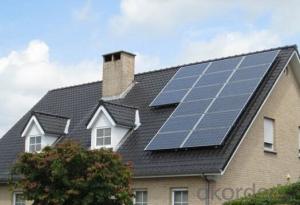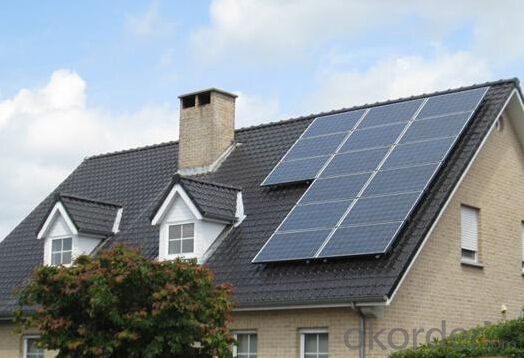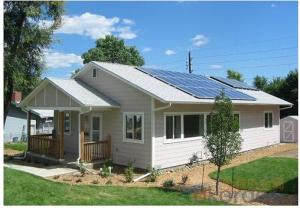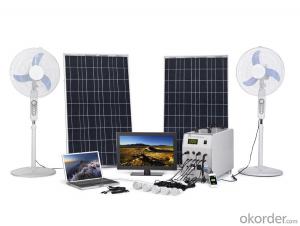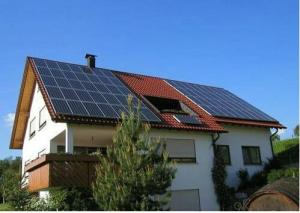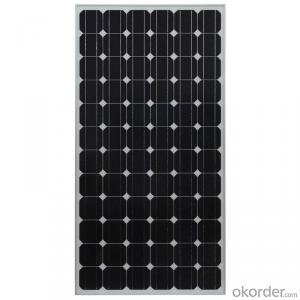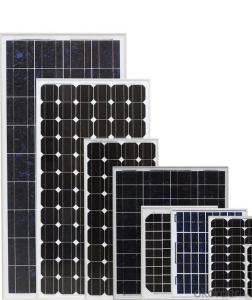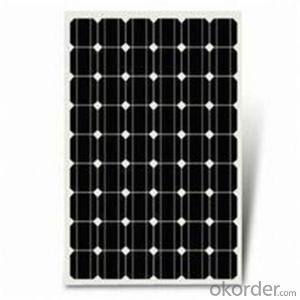Customized Solar Energy Systems - 200W Solar System Made in China
- Loading Port:
- China Main Port
- Payment Terms:
- TT OR LC
- Min Order Qty:
- -
- Supply Capability:
- -
OKorder Service Pledge
Quality Product, Order Online Tracking, Timely Delivery
OKorder Financial Service
Credit Rating, Credit Services, Credit Purchasing
You Might Also Like
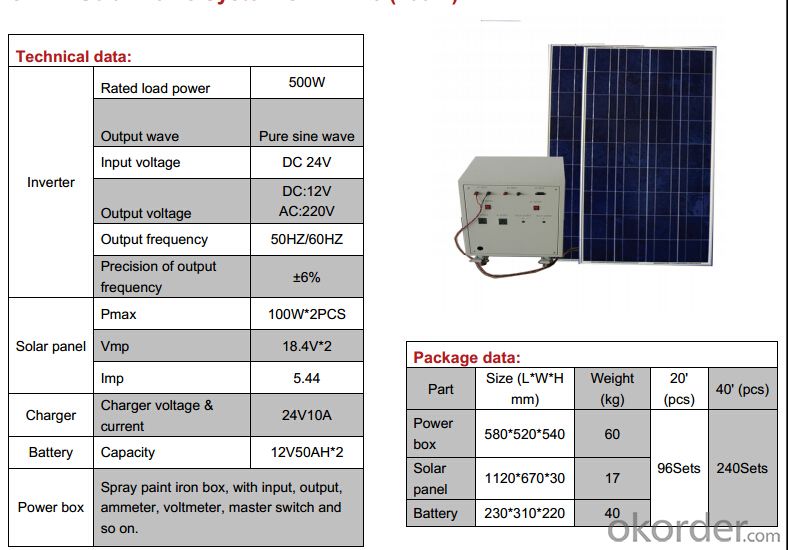
- Q: Can a solar energy system be installed in a residential community with homeowners' association rules?
- Yes, a solar energy system can be installed in a residential community with homeowners' association (HOA) rules. However, the specific rules and regulations regarding solar panel installation may vary depending on the HOA. In some cases, HOAs may have restrictions on the type, size, or location of solar panels. To install a solar energy system in a residential community with HOA rules, homeowners would typically need to follow a set of guidelines or seek approval from the HOA. This may involve submitting an application, providing detailed plans and specifications of the system, and obtaining the necessary permits. Many HOAs have recognized the benefits of solar energy and have adopted guidelines that are supportive of solar panel installations. Some HOAs have even revised their rules to make it easier for homeowners to install solar energy systems. It is important for homeowners to review their specific HOA rules and guidelines, and engage in communication with the HOA to understand the requirements and obtain the necessary approvals. Overall, while it is possible to install a solar energy system in a residential community with HOA rules, it is essential to review the specific guidelines and seek approval from the HOA to ensure compliance and a smooth installation process.
- Q: Can solar energy systems be used in powering outdoor signage or billboards?
- Yes, solar energy systems can be used to power outdoor signage or billboards. Solar panels can be installed on the roof or nearby structures to harness sunlight and convert it into electricity. This electricity can then be used to power the lights or digital displays of the signage or billboards, making them completely independent of the traditional power grid. Solar energy systems are particularly suitable for outdoor signage as they are often located in areas with abundant sunlight. Additionally, using solar energy helps reduce the carbon footprint associated with traditional electricity generation, making it an environmentally friendly choice.
- Q: Can solar energy systems be used in areas with limited access to solar energy incentives and rebates?
- Yes, solar energy systems can still be used in areas with limited access to solar energy incentives and rebates. While incentives and rebates can provide financial benefits and make solar energy more affordable, the installation and use of solar energy systems is not solely dependent on these incentives. Solar energy systems can still be a viable and sustainable option for generating clean energy in areas with limited incentives, as they can help reduce electricity bills and reliance on traditional energy sources. Additionally, advancements in solar technology have made systems more efficient and cost-effective, making them a feasible choice even without incentives.
- Q: How do solar energy systems impact the resale value of a commercial building?
- A commercial building's resale value can be positively influenced by solar energy systems, as several factors contribute to this increase. To begin with, solar energy systems present the building owner with potential energy savings. By harnessing electricity from the sun, the building can decrease its reliance on conventional energy sources, resulting in reduced utility bills. This cost savings can be an appealing selling point for potential buyers, as it not only lowers operational expenses but also offers a more sustainable and environmentally friendly solution. Additionally, solar energy systems are regarded as a long-term investment. They typically come with warranties and have a lifespan of 25 to 30 years or more. This means that a commercial building equipped with a solar system can provide a dependable and consistent source of renewable energy for many years to come. Buyers are often attracted to this added value, as it instills a sense of security and minimizes future energy costs. Moreover, the installation of solar energy systems showcases the building owner's dedication to sustainability and environmental responsibility. In today's market, there is an increasing demand for eco-friendly buildings and businesses that prioritize renewable energy sources. This can entice buyers who share the same values and are willing to pay a premium for a building that aligns with their sustainability objectives. Lastly, the presence of a solar energy system can enhance the overall marketability of a commercial building. With growing awareness and interest in renewable energy, potential buyers may actively seek out properties with solar installations. This heightened demand can lead to a competitive bidding process, potentially driving up the resale value of the building. It is important to acknowledge that the impact of solar energy systems on a commercial building's resale value can vary based on factors such as location, size, and system efficiency. Additionally, market conditions and buyer preferences also play a role. However, overall, solar energy systems have the potential to positively influence a commercial building's resale value by reducing energy costs, providing long-term benefits, attracting sustainability-focused buyers, and enhancing marketability.
- Q: Can a solar energy system be used to power agricultural operations?
- Certainly! Solar energy systems have the capability to be used in order to power agricultural operations. By converting sunlight into usable energy, solar panels and other solar energy systems have the ability to generate electricity. This electricity can then be utilized in order to power a range of agricultural operations, such as irrigation systems, water pumps, machinery, and lighting. Solar-powered irrigation systems are especially advantageous for agricultural operations because they offer a reliable and sustainable source of energy for watering crops. These systems can be designed to automatically switch on and off depending on the availability of sunlight, guaranteeing that crops receive the necessary amount of water. Furthermore, solar-powered water pumps can be employed to extract water from wells or other water sources, decreasing the dependence on fossil fuels and decreasing operational costs. Furthermore, solar energy can also be used to power machinery and equipment utilized in agricultural operations. This encompasses tractors, harvesters, and other types of farm equipment, reducing the reliance on fossil fuels and minimizing carbon emissions. Solar-powered lighting can also be installed in agricultural facilities, such as barns or storage areas, providing illumination without the need for electricity from the grid. In regions with an abundance of sunlight, solar energy systems can be a cost-effective and sustainable solution for powering agricultural operations. These systems offer a variety of advantages, including decreased operational costs, reduced carbon footprint, and enhanced energy independence.
- Q: Are there any risks of electrical fires with solar energy systems?
- Yes, there are potential risks of electrical fires with solar energy systems. While solar panels themselves do not generate heat or pose a direct fire hazard, the electrical components and wiring involved in the system can be a source of concern. Poor installation, faulty wiring, or system malfunctions can lead to electrical fires. Therefore, it is important to ensure proper installation, regular maintenance, and adherence to safety guidelines to mitigate these risks.
- Q: Can solar energy systems be used for powering electric vehicle solar charging garages?
- Certainly, electric vehicle (EV) solar charging garages can indeed utilize solar energy systems. In reality, incorporating solar power into these garages presents a remarkable opportunity to endorse sustainability and diminish carbon emissions. Sunlight can be harnessed and transformed into electricity by installing solar panels on the garage roof or nearby. Consequently, this electricity can be employed to operate the charging stations, delivering clean and renewable energy for EVs. By integrating solar energy systems into charging garages, it becomes feasible to establish a self-sufficient and eco-friendly ecosystem for EV owners.
- Q: What is the difference between on-grid and off-grid solar energy systems?
- On-grid solar energy systems are connected to the local utility grid, allowing excess electricity to be fed back into the grid and enabling the user to draw power from the grid when needed. Off-grid solar energy systems, on the other hand, operate independently and are not connected to the utility grid. They typically rely on batteries to store excess energy for use during times when the sun is not shining.
- Q: How does the efficiency of solar panels vary across different installation angles?
- The efficiency of solar panels can vary across different installation angles due to several factors. The angle at which solar panels are installed determines the amount of sunlight they receive and how effectively they can convert it into electricity. Ideally, solar panels should be installed at an angle that allows them to capture the maximum amount of sunlight throughout the day. This angle is usually determined by the latitude of the installation site. For example, in locations closer to the equator, a lower tilt angle is preferred, while higher latitudes require a steeper tilt angle. If the installation angle is too low, the solar panels may not receive enough sunlight, especially during the winter months when the sun is lower in the sky. On the other hand, if the angle is too steep, sunlight may be reflected off the surface of the panels instead of being absorbed, resulting in a decrease in efficiency. Additionally, the efficiency of solar panels can also be influenced by the orientation of the installation angle. In the northern hemisphere, solar panels facing south tend to receive the most sunlight throughout the day. However, east or west-facing panels can also be effective, especially if there is a need to optimize energy production during specific times of the day. Furthermore, the efficiency of solar panels can be affected by shading. Obstructions such as trees, buildings, or other structures can cast shadows on the panels, reducing their overall efficiency. Therefore, it is essential to consider the potential shading impacts when determining the installation angle. In conclusion, the efficiency of solar panels varies across different installation angles primarily due to the amount of sunlight they receive and how effectively they can convert it into electricity. It is crucial to find the optimal installation angle and orientation to maximize energy production and overall efficiency.
- Q: Can solar energy systems be used in areas with limited roof space due to chimneys or vents?
- Indeed, solar energy systems can still function effectively in areas where roof space is restricted due to chimneys or vents. Although solar panels typically require unobstructed roof space to achieve optimal efficiency, there are alternative solutions accessible for areas with limited roof space. One feasible approach involves installing solar panels on adjacent flat or sloped surfaces, such as the ground or a nearby wall. These ground-mounted or wall-mounted solar systems can be adjusted to maximize exposure to sunlight, ensuring that the panels generate a substantial amount of energy. Another solution entails utilizing solar technologies specifically designed for limited roof space. For instance, solar tiles can be seamlessly integrated into the roof itself, replacing conventional roofing materials while simultaneously harnessing solar energy. These solar tiles can be installed around chimneys, vents, or any other obstructions on the roof, efficiently utilizing the available space. Furthermore, solar energy systems can be combined with other renewable energy sources, such as wind turbines or geothermal systems, to compensate for the limited roof space. By diversifying the sources of renewable energy, it becomes possible to meet the energy requirements of an area even with restricted roof space. In conclusion, despite the challenges posed by limited roof space due to chimneys or vents, there are still viable options for employing solar energy systems. By exploring alternative mounting options, utilizing solar tiles, or combining solar with other renewable energy sources, it becomes feasible to harness solar power in areas with restricted roof space.
Send your message to us
Customized Solar Energy Systems - 200W Solar System Made in China
- Loading Port:
- China Main Port
- Payment Terms:
- TT OR LC
- Min Order Qty:
- -
- Supply Capability:
- -
OKorder Service Pledge
Quality Product, Order Online Tracking, Timely Delivery
OKorder Financial Service
Credit Rating, Credit Services, Credit Purchasing
Similar products
Hot products
Hot Searches
Related keywords
